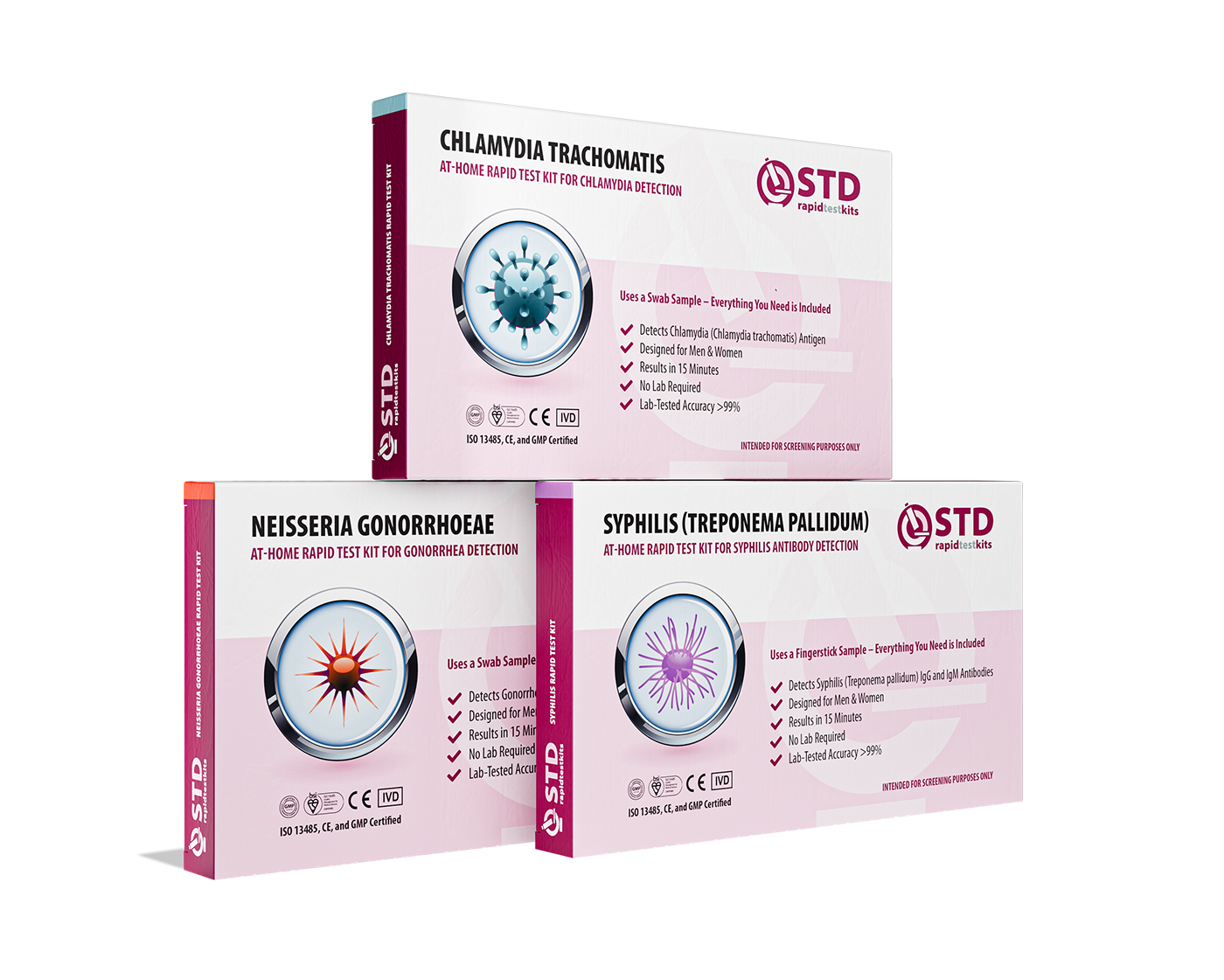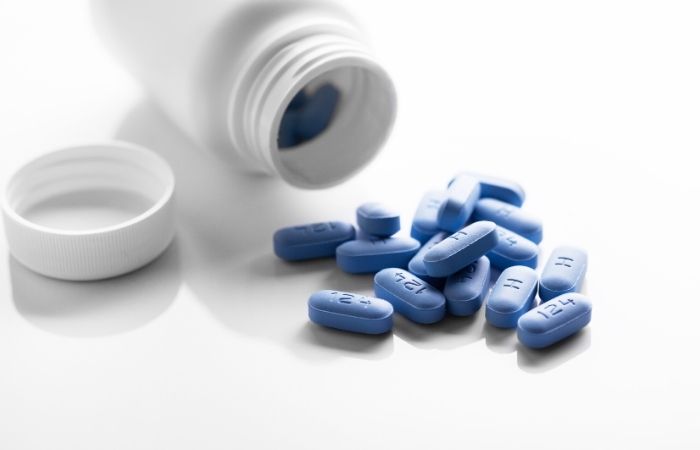STD Symptoms vs No Symptoms: What Should You Test For?
Quick Answer
Are sex parties risky for STIs?
Yes, if STI protocols aren’t followed. But many well-run events have clear expectations around testing, condom use, and disclosure. Your risk depends on your behavior, the event’s structure, and your post-party testing habits.
Sex Parties 101: What Actually Happens?
Let’s ditch the fantasy montage and talk reality. A typical sex party (sometimes called a "play party," "swinger night," or "erotic social") usually involves:
- A curated guest list or open invite depending on the vibe
- Consent check-ins and ground rules (often discussed at the door)
- Safer sex supplies like condoms, gloves, dental dams, and lube stations
- Optional group spaces, private rooms, and social lounges
- A BYO test result or verbal health disclosure expectation, depending on the community
These events vary wildly in tone and risk, from polished, invite-only parties with full STI screening requirements, to underground play spaces where communication is looser and supplies aren’t stocked.
In short? Not all sex parties are created equal. And not everyone is playing by the same health rules.

People Are Also Looking For: How frequently should I be tested for STDs?
What the Research Says About Group Sex and STI Transmission
Group sex inherently includes more potential exposure points: more partners, more acts, more possible routes for transmission. But that doesn’t automatically mean danger.
Here’s what the science actually shows:
- A 2022 study in the Journal of Sexual Medicine found that attendees of organized sex parties were more likely to test regularly for STIs than non-attendees in casual dating pools.
- However, the same study noted higher rates of Chlamydia and Gonorrhea among those who didn’t use barriers consistently or assumed others had tested.
- Another review from the American Sexual Health Association emphasized that group sex risk isn’t about the number of partners, it’s about the lack of protective protocols.
In other words, the risk isn’t the orgy. It’s the absence of structure.
STI Protocols: Do They Exist, and Do People Follow Them?
You’d be surprised how many sex party hosts now require proof of testing before admission. Some events even partner with mobile testing services or offer on-site rapid tests for HIV, Syphilis, and Hepatitis B.
One New York–based host, who asked to go by Mia, told us:
“We don’t let anyone in who hasn’t tested in the last 10 days. We check paper or digital results at the door, no exceptions. It’s about trust.”
Other parties use a more informal honor system. “Have you tested recently?” is as common as “What are your boundaries?” at the start of a hookup. In well-informed circles, disclosure is considered part of foreplay, not a buzzkill.
But enforcement varies. And at less curated events, especially in larger urban scenes, you may not be asked about your testing history at all. That means it’s up to you to be proactive.
Check Your STD Status in Minutes
Test at Home with Remedium3-in-1 STD Test Kit

 For Men & Women
For Men & Women Results in Minutes
Results in Minutes No Lab Needed
No Lab Needed Private & Discreet
Private & DiscreetOrder Now $69.00 $147.00
For all 3 tests
What Infections Spread Most Easily at Sex Parties?
You already know about the “Big Four” (HIV, Herpes, Chlamydia, Gonorrhea). But let’s talk about some high-risk players that thrive in group settings:
- HPV: Spread through skin-to-skin contact, not just penetration. Can be transmitted even with condom use.
- Syphilis: Often asymptomatic in early stages. Highly contagious via oral, vaginal, or anal contact.
- Hepatitis B: Spread through bodily fluids. Can live outside the body for up to 7 days on surfaces.
- Pubic lice and scabies: Yep, still a thing. Intimate contact = easy spread.
Not sure what you’ve been exposed to after a group event? The safest move is a full panel, including HPV and Syphilis, even if you feel fine.
Post-Party Testing: When (and What) to Screen For
You just went to a sex party. You had a great time. Now what?
This is the part too many people skip, and it’s where the real power lies. Your post-event testing routine is the key to protecting your health, your partners, and your peace of mind.
Here’s a realistic STI testing timeline for after a group sex event:
Immediately (Within 72 Hours)
- Emergency contraception, if needed
- HIV PEP (Post-Exposure Prophylaxis), if there was high-risk exposure
- Baseline notes on who you were with and whether protection was used
2 Weeks Later
- Test for Gonorrhea and Chlamydia if symptoms show up early
- These bacteria can appear quickly, especially in the throat, rectum, or urethra
- Don’t forget: oral sex can transmit both, so site-specific swabs matter
Use a targeted Gonorrhea or Chlamydia test kit if you had unprotected oral or anal contact
3–6 Weeks Later
- Screen for Syphilis, Hepatitis B, and Herpes
- Syphilis in particular has a stealthy early stage and can go unnoticed for weeks
- Herpes may not appear in standard panels, you’ll need to request it (or test at home)
4–6 Weeks to 3 Months
- HIV window periods vary depending on the test (antigen/antibody vs. RNA)
- If high-risk exposure occurred, test again at the 3-month mark to confirm status
The key message here isn’t panic, it’s pattern. Make STI testing part of your regular aftercare, just like rehydrating, debriefing with friends, or checking in with partners.

People Are Also Looking For: Is it safe to have vaginal and anal sex during the same encounter?
Condom and Barrier Culture: What’s Normal at a Sex Party?
Let’s answer the question most people are too shy to Google: Are condoms used at sex parties?
Short answer: It depends. Long answer: It really depends.
In higher-end or medically-informed play spaces, there’s a strong condom culture, with bowls of condoms at every corner, lube and gloves available, and regular reminders to use barriers, especially during penetrative acts.
In other scenes? There’s less enforcement. Some attendees rely on status disclosure ("I'm clean"), while others assume everyone is on PrEP for HIV and don't use condoms at all, especially for oral or group play.
Here's what a veteran guest, Luis, 38, told us about his city’s circuit:
“At the smaller invite-only events, condoms are non-negotiable. The host lays it out clearly. But I’ve been to a few massive raves where it was a free-for-all. People assume you're on meds, and nobody wants to stop to glove up.”
That assumption is where risk creeps in.
Herpes, HPV, and Syphilis can all be transmitted skin-to-skin, especially when condoms are skipped for oral or outercourse. And even when condoms are used, friction, breakage, and slippage during intense or extended playcan still allow for infection.
Best practice? Bring your own supplies. Use a new barrier with every partner. Don't rely on someone else's testing status as your safety net. And yes, it’s okay to ask:
“Hey, are you comfortable using a condom? I brought extras.”
If they say no? You have every right to decline. Boundaries don’t kill the vibe, they define it.
Order Now $189.00 $490.00 Check Your STD Status in Minutes
Test at Home with Remedium
10-in-1 STD Test Kit




For all 10 tests
What Hosts Say: Behind the Scenes of a Safer Party
We spoke to three sex party organizers in the U.S. and U.K. to get real about how STI protocols work behind the scenes.
Devon, 42, runs a monthly queer kink party in San Francisco
“We require test results within 7 days. We have a Google form for verification, and our greeters are trained to spot screenshots versus real lab reports. If you don’t bring proof, you don’t get in.”
Devon also said they provide Herpes disclosure templates for guests and host sexual health workshops between parties.
Marina, 35, co-hosts a New York femme-for-femme salon
“We’re less strict about paperwork, but our invite list is tight. We screen people beforehand and make STI expectations clear. Condoms and gloves are literally everywhere. We even play a game where you win prizes for using the most lube.”
Rich, 51, organizes bi-monthly swinger events in the U.K.
“I don’t check test results. We’re adults, it’s up to you to protect yourself. But I always have condoms on hand, and I make sure everyone knows where the toilets and hand-washing stations are.”
The takeaway? Even among responsible hosts, STI protocol enforcement varies widely. That’s why your personal practices, testing, boundaries, communication, matter most.

People Are Also Looking For: Do I need to clean sex toys if I use them on the same individual?
Busting the Biggest Myths About Sex Parties and STIs
Let’s get into the good stuff, the myths that keep people confused, shamed, or overconfident. If you're going to play, play smart. That starts with knowing what's real.
“Everyone at sex parties has STDs.”
False. In fact, many sex party regulars test more frequently than the average monogamous person. What you’re likely seeing isn’t more infection, it’s more transparency.
That said, open disclosure ≠ immunity. Use protection, and get tested regardless of whether anyone “looks clean.”
“If you use condoms, you’re totally safe.”
Safer? Yes. Totally safe? No.
HPV, Herpes, and Syphilis can be spread from contact with skin that condoms don’t cover, think inner thighs, scrotum, labia, or pubic mound. Barriers help. So does limiting partner count per event and checking for visible sores or symptoms (though many STIs are invisible).
“If they didn’t ask about your test results, it must not be that kind of party.”
That’s on them, not you. You’re still responsible for your body. If someone doesn’t ask about protection or STI status, it’s your sign to lead that convo, or walk away.
You don’t need to match the risk level of the room. You set your own.
Order Now $149.00 $392.00 Check Your STD Status in Minutes
Test at Home with Remedium
8-in-1 STD Test Kit




For all 8 tests
Practical Takeaways: Keeping Sex Hot and Safe
Let’s be real: you don’t want to go to a sex party and feel like you’re in a science lab. But there’s a middle ground between wild abandon and sterile caution. It looks like this:
- Test before and after any event with new partners. Use time-based spacing (2 weeks, 4 weeks, 3 months) for full detection.
- Use a new barrier with every partner, even if you’re switching back and forth between oral and penetration.
- Don’t rely on others to provide protection. Bring your own condoms, lube, gloves, and wipes.
- Plan your exit strategy: know when you’ll test next, how you’ll check in with partners, and how you’ll respond if something turns up positive.
If you need quick, accurate results for common infections, STD Rapid Test Kits has discreet options for every level of concern, including specific kits for Chlamydia, Gonorrhea, HIV, and more.
FAQs
1. Are sex parties safe if everyone gets tested?
They’re safer, but not risk-free. Even with universal testing, window periods and skin-to-skin transmission can still result in exposure.
2. What’s the riskiest STI at a sex party?
It depends, but Syphilis and HPV spread easily through skin contact and are often asymptomatic. Both are common at events where barriers are inconsistent.
3. Should I get tested after every party?
If you had new partners or unprotected contact, yes. Even if you use protection, routine testing helps catch infections early and avoid spreading them.
4. Can I ask someone about their test results without sounding rude?
Absolutely. Try: “Hey, I always ask this before I play, have you tested recently?” That’s more respectful than assuming.
5. How do I talk to a partner if I tested positive after a party?
Be direct, compassionate, and factual. Tell them when you tested, what the result was, and that you're letting them know for their health, not for drama.
6. Can I get Herpes even if my partner has no symptoms?
Yes. Asymptomatic shedding is real, especially with HSV-2. Use barriers and consider testing if you’ve had close contact.
7. Are at-home STD tests accurate?
Yes, when used properly and from reputable brands. Kits for HPV, Syphilis, and Herpes are widely available and match clinic-grade accuracy.
8. Do I need throat or rectal swabs after group sex?
If you received oral or anal sex, yes. Many STIs hide in those areas and won't show in standard urine or blood tests.
9. What should I bring to a sex party?
Condoms, lube, gloves, breath mints, wipes, clean towels, and a clear understanding of your boundaries and testing status.
10. What’s the biggest mistake first-timers make?
Assuming that vibes = safety. Always verify. Protect yourself, even when the party seems perfect.

Stay Safe. Protect Yourself.
Sex parties aren’t inherently dangerous. What makes them risky is assumption, that someone else is managing your safety for you.
So whether it’s a masked kink salon or a four-room swinger bash, you’re not paranoid for wanting to test, protect, and clarify before you play. You’re responsible. And sexy as hell for it.
Group sex doesn’t mean group panic. Stay in control by testing regularly for common STDs like HPV and Syphilis with reliable, at-home options. Go have fun. Just make sure your afterglow includes a plan.
Sources
1. Sex club/party attendance and STI among men who have sex with men – BMJ (STIs study in NYC)
2. The dangers of medication sharing at private sex parties – The Lancet Infectious Diseases
3. Sex Parties among Urban MSM: An Emerging Culture and HIV Risk – Springer
4. Party and Play (chemsex) – Wikipedia (drug-fueled sex and STI risks)
5. Group Sex – Wikipedia (increased STI exposure with multiple partners)
6. How STI and HIV Testing at Sex Parties Promotes Sexual Health – The Body










